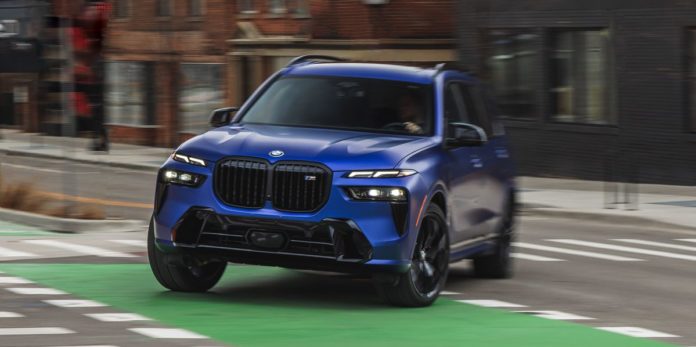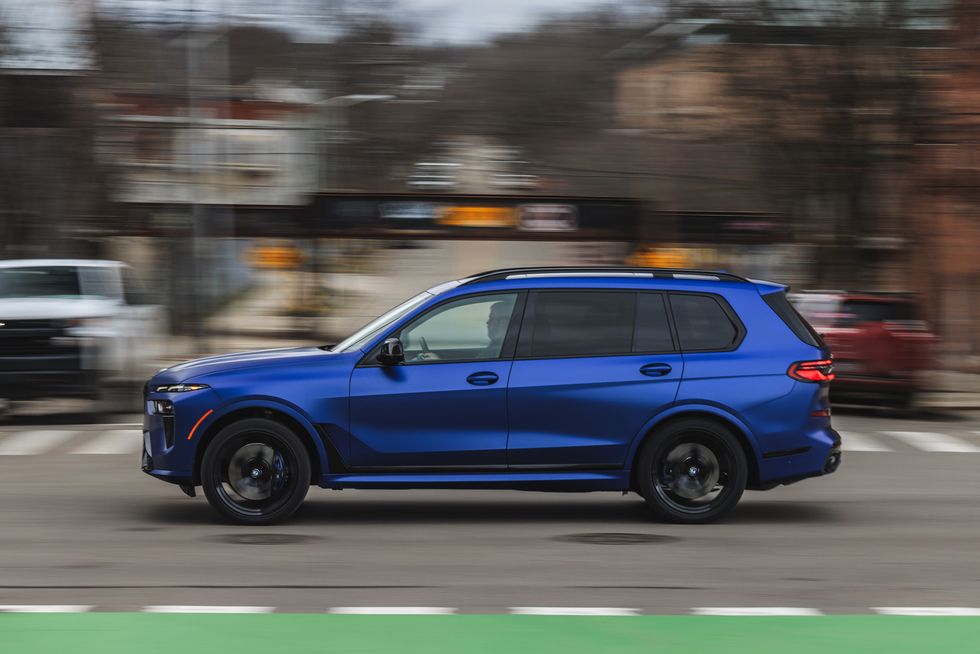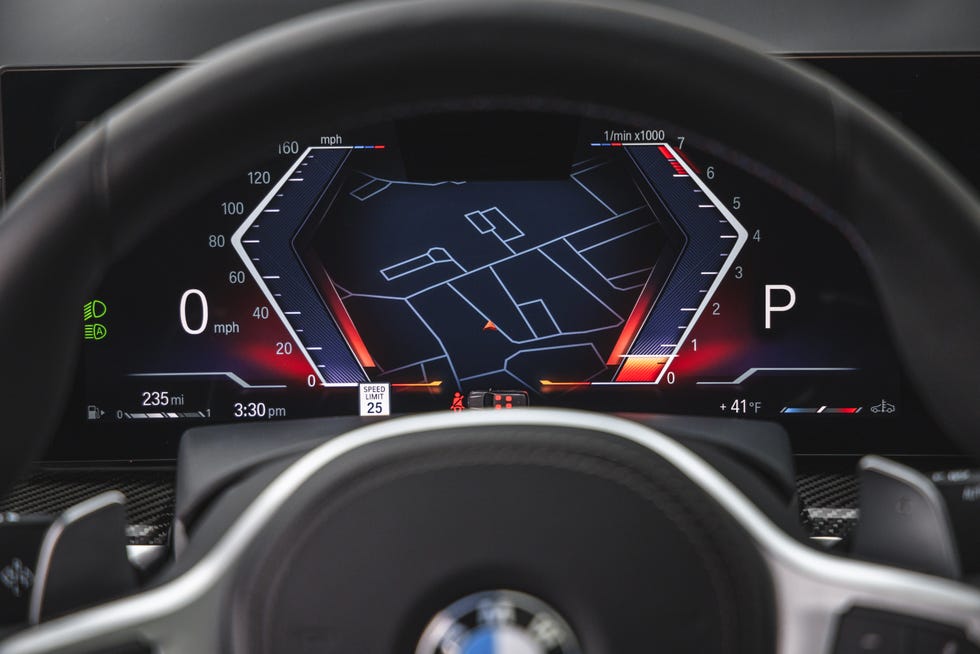UPDATE 1/26/23: This review has been updated with test results for the M60i.
Love it or hate it, BMW’s controversial styling is here to stay. The grilles keep getting bigger, the headlights keep getting weirder, and yet the brand’s sales remain strong. This time around, it’s the big X7 SUV’s turn for facial surgery. The 2023 model has an updated look meant to bring it in line with the new-generation 7-series sedan, and it’s polarizing. There’s more to the new X7 than revised front- and rear-end designs, however, as the model also sees upgraded engines, a spruced-up interior, and several new standard and optional features.
While the previous X7 looked pretty much like a stretched and inflated X5, the new front end makes a more distinct statement with its eyebrow-like daytime running lights above the squared-off headlights mounted lower on the fascia. BMW admits it’s not the first automaker to adopt this inverted-headlight look. We can’t help but notice that earlier vehicles that tried it, such as the Jeep Cherokee and the Nissan Juke, either quickly abandoned it or have been dropped altogether. Nonetheless, we won’t be surprised if the X5 and X6 eventually adopt this face too. Sigh.
The X7’s tail is more pleasing to the eye, as the added chrome bar and revised taillights make for a crisp appearance. There are also new wheel designs, including a massive 23-inch option for the first time. Those big rollers are best avoided, though, as the X7 we drove with the 23s rode harshly over big bumps. The 21- and 22-inchers ride better and still fill out the wheel wells just fine.
Once again, the X7 offers a choice of six-cylinder or V-8 power. BMW says the vast majority of buyers choose the xDrive40i model with a turbocharged 3.0-liter inline-six, and that’s the engine that has received the more significant upgrades. It gains 40 horsepower and 52 pound-feet of torque for new totals of 375 horses and 383 pound-feet—now surpassing the Mercedes-Benz GLS450 in both regards. On top of that, a 48-volt hybrid system adds torque that juices the total up to 398 pound-feet. The twin-turbo 4.4-liter V-8 also gets the 48-volt system, but its output is unchanged at 523 horsepower and 553 pound-feet. Don’t be fooled by the V-8’s new M60i model designation replacing the previous M50i. BMW says this change in nomenclature was merely meant to align gas-engine trim levels with electric models, including the new iX M60.
To be fair, the M60i did live up to its bigger badge number by delivering better results at our test track. It got to 60 mph in 3.8 seconds, beating our long-term X7 M50i by 0.3 second, and ran through the quarter-mile in 12.3 seconds at 111 mph, a 0.4-second improvement. That 60-mph sprint is only 0.1 second behind the significantly more powerful, 612-hp 2021 Alpina XB7. But the Alpina does pack an even bigger, 630-hp punch for 2023, so it should be able to maintain its slim bragging rights.
The powertrain upgrades don’t do much to change the engines’ character. Like before, the V-8 is fun, with a snorty exhaust note and a delightful shove of torque. It’s hard to deny the draw of 523 burbling horsepower in a big vehicle like this. And yet, the inline-six is so smooth and pleasant that it’s an equally appealing choice. Although less raucous than the V-8, the six, with its quiet demeanor, is well suited to a luxurious people hauler. Plus, the xDrive40i is hardly lacking for power, and its EPA combined fuel-economy rating is a respectable 22 mpg, 4 mpg better than the M60i’s. Our M60i test vehicle returned 23 mpg in our 75-mph highway-fuel-economy test, beating its EPA estimate by 2 mpg.
Accurate steering, good sightlines, and a composed chassis help the X7 drive smaller than it actually is. Although there’s plenty of body roll in the standard air suspension’s loosey-goosey Comfort mode, the X7 corners well in the firmer Sport mode, with a surprisingly high grip threshold—0.85 g on our skidpad—and strong brakes that stopped the X7 from 70 mph in a short 155 feet.
Even so, the X7 is most enjoyable when you settle into the plush seats and just cruise. The interior comprises rich materials and plenty of new standard features, including more adjustments for the front seats, a panoramic sunroof, and four-zone climate control (five zones are an option, with the fifth setting for those in the rearmost row). The new curved display screen that’s propagating across the BMW lineup incorporates a 12.3-inch digital gauge cluster and a 14.9-inch center touchscreen. You can control the latter with the iDrive knob on the center console, and BMW’s latest operating system remains relatively easy to use given its complexity.
As is becoming de rigueur among full-size luxury SUVs, the X7’s list of driver-assistance features has grown to include a hands-free driving function. Unlike Cadillac’s Super Cruise or Lincoln’s ActiveGlide, however, the X7’s system is hands-free only at lower speeds, such as in a traffic-jam scenario. With so many cameras and sensors onboard, BMW also throws in functions such as a trailer backup assist and a park-assist system that can “remember” certain maneuvers and autonomously guide you into or out of a tight garage.
The X7 already had a lot going for itself as one of the more luxurious and best-driving entries in the full-size-SUV class. It doesn’t come cheap—our M60i test car stickered for $122,545—but neither do its competitors. For 2023, the numerous upgrades, namely improved powertrains and an appealing array of technology, only reinforce its position at the top of the segment. And although the X7 was never a great beauty—nor is any giant barge like this, for that matter—the funky new front end is really the only catch.
Specifications
Specifications
2023 BMW X7 M60i
Vehicle Type: front-engine, all-wheel-drive, 6-passenger, 4-door wagon
PRICE
Base/As Tested: $104,095/$122,545
Options: Frozen Marina Bay Blue Metallic paint, $5500; Bowers & Wilkins audio system, $3400; black full Merino leather upholstery, $2700; Executive package (glass controls, heated and cooled cupholders, front massaging seats, Panoramic Sky Lounge LED roof), $2100; Driving Assistance Pro package (adaptive cruise control, active lane-keep assist, steering and traffic-jam assistant, automatic lane changing, evasion assist and front cross-traffic alert), $1700; Climate Comfort package (five-zone automatic climate control, ventilated front seats, heated front and rear seats), $1600; second-row captain’s chairs, $850; M Sport Pro package (extended Shadowline trim, M Sport brakes with blue calipers), $300; carbon-fiber trim, $300
ENGINE
twin-turbocharged and intercooled DOHC 32-valve V-8, aluminum block and heads, direct fuel injection
Displacement: 268 in3, 4395 cm3
Power: 523 hp @ 5500 rpm
Torque: 553 lb-ft @ 1800 rpm
TRANSMISSION
8-speed automatic
CHASSIS
Suspension, F/R: multilink/multilink
Brakes, F/R: 15.6-in vented disc/15.7-in vented disc
Tires: Pirelli P Zero PZ4 Run Flat
F: 275/40R-22 107Y Extra Load ★ KS
R: 315/35R-22 111Y Extra Load ★ KS
DIMENSIONS
Wheelbase: 122.2 in
Length: 203.6 in
Width: 78.7 in
Height: 72.2 in
Passenger Volume, F/M/R: 58/50/34 ft3
Cargo Volume: 12 ft3
Curb Weight: 5838 lb
C/D TEST RESULTS
60 mph: 3.8 sec
100 mph: 9.8 sec
1/4-Mile: 12.3 sec @ 111 mph
120 mph: 14.6 sec
Results above omit 1-ft rollout of 0.2 sec.
Rolling Start, 5–60 mph: 4.9 sec
Top Gear, 30–50 mph: 2.8 sec
Top Gear, 50–70 mph: 3.1 sec
Top Speed (gov ltd): 129 mph
Braking, 70–0 mph: 155 ft
Braking, 100–0 mph: 316 ft
Roadholding, 300-ft Skidpad: 0.85 g
C/D FUEL ECONOMY
Observed: 15 mpg
75-mph Highway Driving: 23 mpg
75-mph Highway Range: 500 mi
EPA FUEL ECONOMY
Combined/City/Highway: 18/16/21 mpg
C/D TESTING EXPLAINED




